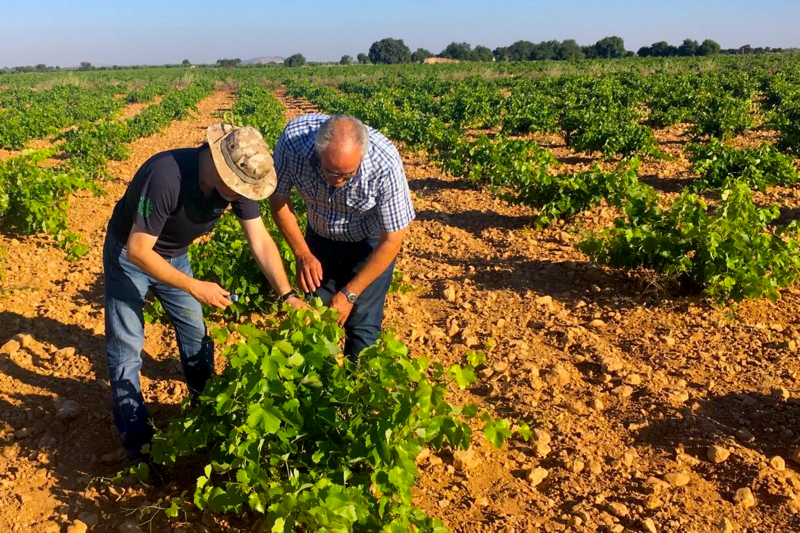
Following the reduction in the use of chemical pesticides, beneficial insects and microorganisms are increasingly introduced for the effective control of pests and diseases in many crops.
We will be present at the next edition of the international Fruit Attraction Fair, which will be held at IFEMA Madrid from October 3 to 5, stand (9E24). We will showcase a complete catalogue of biological solutions that have proven to be effective in controlling pests and diseases in both protected and outdoor crops.
Based on the use of insects and beneficial microorganisms, our biological solutions are inspired by Nature's own rules of the game, such as parasitism or predation, ecosystem balances, and survival mechanisms. For this reason, biological control is the essential basis for carrying out integrated crop management. It is the most natural and sustainable way to guarantee plant health, since biological control does not leave chemical residues, requires no pre-harvest interval, nor generate resistance in pests.

Chemical resistance
At the fruit attraction we will show how growers can face the new challenges in agriculture, such as emerging pests, climate change and drought. ‘Our experience of more than 50 years, together with our great capacity for innovation, makes our solutions the safest and most effective biological alternative on the market. We offer unmatched quality throughout our portfolio and continuous technical advice adapted to the needs of the grower, so that the implementation of biological control is as easy and as successful as possible,’ explains Juan Miguel Rodríguez, Commercial Director of Koppert Spain.
Currently, biological control has special relevance because it makes 100% natural solutions available to growers that contribute to recovering biodiversity both in the aerial part of the plant and in the soil. It has been shown that the greater the biodiversity, the greater the capacity of crops to cope with stress caused by biotic factors (such as new pests or sudden outbreaks of pests) and abiotic factors (for example, drought). ‘All our solutions for biological control of pests and diseases respond to the needs of growers, who demand effective, economically viable products that respect the environment,’ says Juan Miguel Rodríguez.
Control soil-borne diseases
Hundreds of growers in Spain already trust Trianum, a biofungicide to protect their crops against soil-borne diseases. This biological fungicide, based on the beneficial fungus Trichoderma harzianum T-22, can control a wide variety of soil-borne diseases such as Pythium, Rhizoctonia and Fusarium in many different greenhouse and outdoor crops.
‘The effectiveness of Trianum is comparable to that of a chemical fungicide, but while chemicals put stress on the plant, Trianum makes the plant more resistant to stress. The beneficial fungus of Trianum facilitates the development of a healthy root system and improves the absorption of water and nutrients, stimulating plant growth,’ explains José Miguel Fernández, Product Manager Microbiological Products at Koppert Spain. Like most biocontrol methods, Trianum does not require special application equipment. ‘Trianum is available in different formulations to adapt to the different application systems used by growers. Trianum-P can be applied through irrigation and Trianum-G can be applied in granular format, directly to the soil,’ adds José Miguel Fernández.
Koppert has the largest microorganism production plant in Europe and offers other solutions that are revolutionizing the way of controlling very common pests. This is the case of bioinsecticide, Mycotal, based on the beneficial fungus Lecanicillium muscarium Ve6, which has demonstrated its high effectiveness in controlling whiteflies in greenhouse crops. The fungus contained in Mycotal acts faster than other products based on Beauverias, thanks to its powerful formulation in an exclusive blastospore format, which is the most effective natural form that a fungus can take.

Beneficial nematodes
Currently, beneficial nematodes (entomopathogenic nematodes that do not cause any damage to the plant) have proven to be a foolproof remedy for controlling foliar and soil pests. Thanks to our exclusive formulation, beneficial nematodes remain dormant until mixed with water. Once activated, they instinctively hunt their prey, parasitizing and feeding on them until they are killed.
Beneficial nematodes are incredibly versatile and protect against a wide spectrum of soil pests such as lepidoptera, wireworms, fly larvae and beetles in fruit and vegetable crops. Excellent results have also been confirmed with beneficial nematodes against foliage pests, especially caterpillars, as in the case of Tuta ABSOLUTA in tomatoes.
We look forward meeting you at our stand (9E24) during the Fruit Attraction in Madrid and to discuss how we can help you to control pest and diseases in your crop. Our business Development Manager Valter Ceppi is part of the innovation panel from 10.30-12.00 in Hall 5, Fruit Next 5.